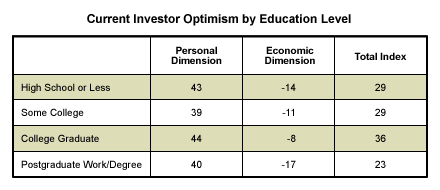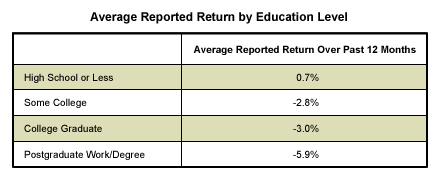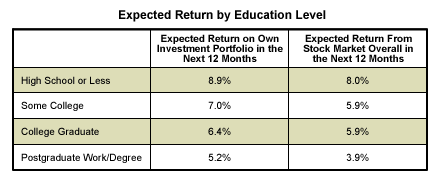During high school graduation season, the air is thick with exhortations from parents and guidance counselors about the benefits of college, the value of education, and the personal joy of being well-rounded. When the kids mutter about being tired of school, parents fall back on the most effective argument for going to college -- people who do make more money. The Census Bureau recently found that over a lifetime, college graduates make about $1 million more than high school graduates, and those with doctorates make $2 million more than people with bachelor's degrees do.
Clearly, education has its rewards. But recent Gallup data suggest that investment returns and optimism about one's economic future may not be among them.
Optimism 101
The recession is depressing nearly everyone, so it's no surprise that the UBS/Gallup Index of Investor Optimism (which surveys only those with $10,000 or more in investable income) keeps finding record declines in investor optimism. It may, however, be somewhat surprising that education levels seem to have little relationship to optimism. In the first four months of 2003*, the overall investor optimism index score among those who have done or completed postgraduate work was at 23. Overall optimism for those with a high school education or less or some college was at 29. The most optimistic were college graduates with no postgraduate education, who were at 36. Bottom line: There is no linear correlation between education and investor optimism.

Just as education and optimism don't rise together, neither do education and self-reported investment returns. In fact, the most educated reported having the worst returns of all. Those investors with a postgraduate education had an average return of -5.9% in the last 12 months. College graduates said they lost a little less, -3%, about equal to those who had some college (-2.8%). Investors with just high school education or less said they actually made money, with an average 0.7% gain in the last 12 months. The less highly educated group may be less inclined to take short-term risks with their investments during turbulent economic times, and therefore favor more conservative investments such as money markets, certificates of deposit, and bonds.

Sunnier Future
Whatever the reason for their lower returns over the past year, it may be coloring postgrads' hopes for the next 12 months as well. Those with postgraduate education told Gallup that they hope to have a 5.2% return on their investment portfolio in the next 12 months, and that they predict the stock market will provide a 3.9% return for everyone. College graduates say they hope for a 6.4% return on their own portfolios, and expect investors to get 5.9% from stocks. People with some college expect to make 7% from their portfolios, and see a 5.9% return from the stock market. The outlook for the next 12 months among those with high school educations or less included an 8.9% return on their own portfolios, and an 8% return from the market in general.

*Results for telephone interviews with 3,994 investors with $10,000 or more in investable income, aged 18 and older, conducted January 2003 through April 2003. For results based on the total sample, one can say with 95% confidence that the margin of sampling error is ±1.7%.
